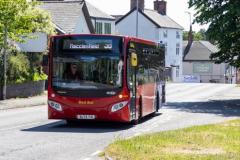
Moves to roll-out superfast broadband across Cheshire have been given a major boost.
The Government has given the green light to enable a partnership of Cheshire Councils to move a step closer to being able to deliver high-speed internet services to its communities.
It is estimated that faster broadband will boost the whole of Cheshire's economy by £1.3 billion over the next 15 years and create around 11,000 jobs. The news comes as a business group warned that economic development in rural areas is being put at risk because of failures to provide adequate access to the internet.
Yesterday, the Country Land and Business Association said up to a fifth of people in rural areas nationally still do not have adequate broadband services.
The Connecting Cheshire Partnership, comprising Cheshire West and Chester, Cheshire East, Warrington and Halton Councils, has now been given Whitehall approval for progression to the 'pre-procurement' stage.
The partnership has so far received more than £3m in government funding for the roll-out of superfast broadband, but needs up to £40m in order for the project to reach 100% coverage. In Cheshire East, up to 110,000 homes and businesses could miss out without this public investment.
Broadband Delivery UK (BDUK), the government's authority for implementing superfast broadband carried out a comprehensive assurance process of the Connecting Cheshire project to ensure that it is ready to enter the next stage in the formal procurement process.
This will include the appointment of a telecommunications partner to provide superfast broadband networks where commercial roll-out has not been economically viable.
Council funding will be used to match Government funding of £3.24m already received to date, combined with an anticipated £15m grant from the European Union to deploy new superfast broadband networks, from 2013, in areas where commercial providers have not yet upgraded the existing broadband infrastructure.
Connecting Cheshire expects to appoint either BT Openreach or Fujitsu as its partner next April, in line with a national procurement exercise overseen by BDUK.
The appointed telecom company will also provide matched funds bringing the Connecting Cheshire project total cost to around £39m. This combined investment is expected to ensure that the project will exceed the Government's target of 90% of homes and businesses being able to connect to superfast broadband by 2015.
Councillor David Brown, Deputy Leader of Cheshire East Council and Cabinet member in charge of strategic communities, said: "This is particularly good news for our rural areas, which have been struggling with slow and unreliable speeds for some time.
"We are now much closer in our quest to ensure Cheshire can benefit both socially and economically from faster broadband speeds.
"As the Connecting Cheshire project moves into closer dialogue with telecom providers, it will be crucial to demonstrate a high level of demand. So I urge everyone to join our campaign for Better Broadband in Cheshire.
"Over 3,200 residents and 500 businesses have registered so far. This takes just a matter of minutes and will help ensure your community or businesses can be prioritised for investment in faster broadband. Simply register at www.connectingcheshire.org.uk"









Comments
Here's what readers have had to say so far. Why not add your thoughts below.
Will this move to superfast broadband still use the copper connection to the exchange (ADSL2 perhaps - faster, but still throttled by miles of old copper wire between one's house and the exchange), or will it require that every house have a fibre optic connection? Or perhaps a compromise - fibre to the telephone pole in your road, copper for just the last hop to one's house?
Anyone know?
What I would like to see an explanation to is the statement "It is estimated that faster broadband will boost the whole of Cheshire's economy by £1.3 billion over the next 15 years and create around 11,000 jobs." who said that and how were the calculations done?
Since we got fibre-optic cables I'm not aware of any more jobs being created locally at all which could be thus attributed.